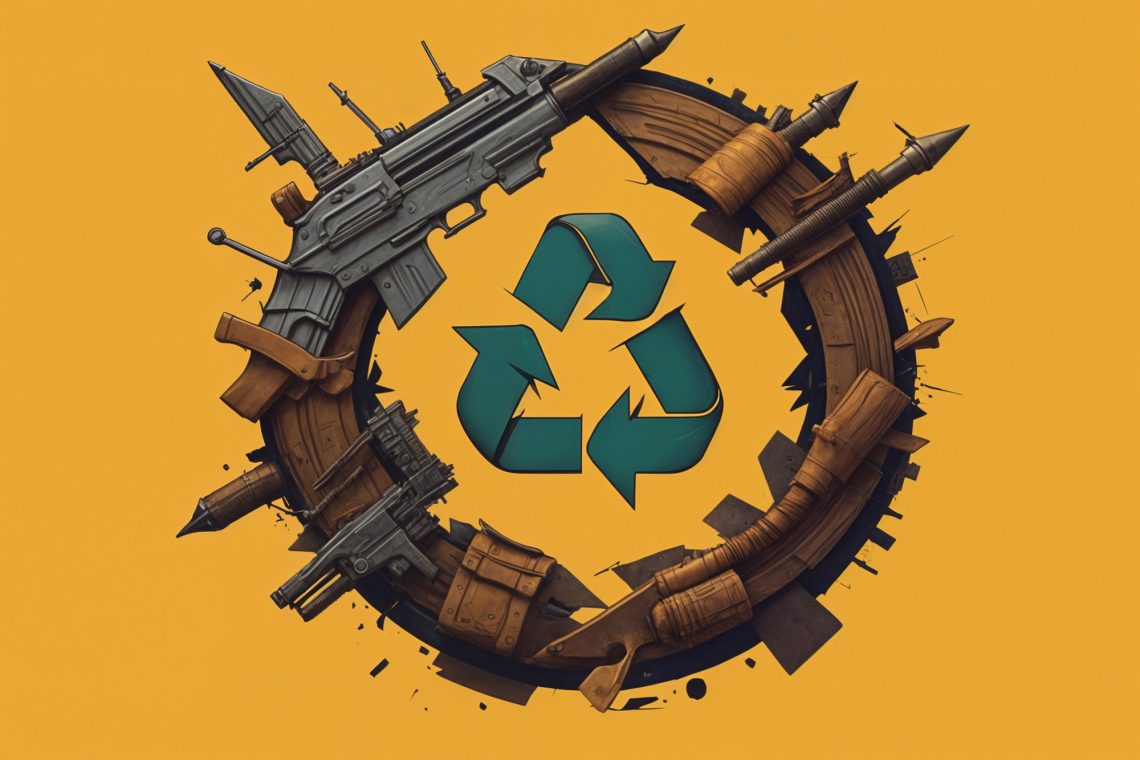Since autumn 2023, people all over the world intensified their organizing activities in solidarity with Palestinian liberation and against Israel’s ongoing colonial violence. In many cases, this mobilization found support from people who emphasize the substantial environmental issues linked with Israel’s settler-colonialism.
In Germany, however, most groups within the environmental and climate movement either ignore or actively oppose any efforts critical of Israel. Their position showcases the danger of the mutually reinforcing links between racist, colonial, and fascist tendencies that continue to push Western environmentalism.
Extractive legacies in a green disguise
After 7 October 2023, activists concerned with Israel’s occupation of Palestine are facing increased repression, marginalization, and stigmatization.
Yet, most German environmental and climate groups seem neither concerned about these developments nor the ongoing catastrophe in Palestine. Their blatant absence from efforts to address the interlocked violence in Palestine, Sudan, and Congo reinforces a complicit silence with the German state’s colonial and racist ambitions.
Moreover, this behavior reflects the unwillingness to genuinely engage with how Germany is entangled with white supremacy, such as by German settler colonization in Turtle Island/US & Canada, the German Empire’s colonial atrocities in Cameroon, and its genociding of the Nama and Herero in today’s Namibia.
These tendencies have continued in the “post-racial” and “post-colonial” inclusion politics since WW2, including West Germany’s support of colonial reassertions during the Cold War.
The widespread lack of reflective engagement with these legacies fragments solidarity and enables complicit silence, as an interviewee with years of experience linking anti-colonial struggles via environmental grassroots organizing in Germany emphasized:
“There’s a reason groups like BIPOC For Future need to exist: there are no safer spaces within most of the environmental movement in Germany. By publicly denouncing Israel and aligning themselves with the Palestinian cause, public figures could really make a difference. But that didn’t happen. It still isn’t.”
The privilege of ignoring certain problems and realities is aided by a perception that makes it appear needless to confront one’s positionality. Yet, it is widely recognized that the German government promoted numerous noteworthy and deeply concerning policies over the recent years, besides the massive increase in spendings for the military-industrial complex.
In 2022, Germany’s Vice-Chancellor Robert Habeck secured a 15-year LNG (Liquefied Natural Gas) deal with Qatar, seemingly unphased by their financial support of Hamas and frequent reports of environmental and human rights abuses. European nations also increased collaboration with the UAE, such as a recently agreed 15-year gas supply deal with Germany.
Next to the UAE’s ties to the violence in Sudan, the country greenwashes its activities via state-owned company Blue Carbon, forcefully displacing the Indigenous Ogiek people in Kenya.
It is crucial to consider such external influences beyond the internal tensions in Sudan, especially regarding access to fossil fuels and mineral reserves. On top of that, several rights groups questioned how EU funds for migration are tied to the violence in Sudan, first in 2019 and then in more recent reports from Egypt.
Complicity and the German environmental movement
People working alongside communities that are most affected by environmental and climate crises have long warned of an intensification of structural racism and reinforcements of oppressive tendencies in Germany.
The persistent silence and lack of substantial action on these issues in Germany underscores a profound disconnect with struggles led by the global majority. Reactions to Greta Thunberg’s expression of solidarity with Palestinians exemplify this.
For years, a self-centered, objectifying narrative about Greta and Fridays for Future has unfairly projected intergenerational guilt onto the youth. This repressive portrayal relies on the idea of an inherited primordial debt that intends to make everyone complicit who is born into a world that “benefited” from fossil fuel-driven global capitalism.
Such arguments distract attention away from those who willfully exacerbate the environmental and climate crises, like governments in cahoots with big oil industries that downplayed early warnings on climate impacts since the 1970s. It also belittles the significant strides youth are making to dismantle structural oppression and advance sharper positionally informed analysis, like Greta’s condemnation of colonial extraction in Sápmi.
Most German commentators seem more worried about Greta causing a “split” in the movement and the loss of supporters than Israel’s violent destruction of lands and genociding of Palestinians. The racist disregard for the lives of Palestinians stems from the same logic that views Israel’s colonial “development” of the territory as superior to the intergenerational practices of Palestinians.
This dynamic reflects the stubborn unwillingness of many actors in Western movements to divest from oppressive worldviews, organizational structures, and political practices. But the signs of a change are everywhere. Various FFF (Fridays for Future) groups in Germany have dissolved in protest, like in Marburg and Bremen, and new groups were formed, like BIPOC for Future or Klima4Palästina.
In a late October 2023 Die Zeit interrogation of Luisa Neubauer, a popular spokesperson of FFF Germany, the national branch of the international climate youth movement, she distanced herself from Greta, believing it would not be within the goals of a climate movement “to place ourselves at the center of crises that take place beyond climate issues.” She didn’t seem to be concerned about these aspects when joining a panel by Akademie der Künste in January 2024 titled “Climate justice, colonialism, and the Capitalocene.”
After months of “participating in racist agitations”, FFF Germany’s call for a ceasefire in March 2024 is nothing more than a hollow attempt to remain a relevant actor, commented BIPOC for Future and Migrants For Future.
The double standard and inconsistent solidarity highlighted in their statement become even more pronounced when considering some of Luisa’s earlier statements, like a 2021 podcast interview with the researcher Imeh Ituen. Here, Luisa regards the “Middle East” as a prominent manifestation of “using imperialist interventions” for “colonial resource exploitation patterns”, “turning entire regions into crisis zones”, and “obstructing the building of sustainable democracies”.
A similarly concerning tendency has caught up to another large alliance from the more “radical” spectrum of Germany’s environmental and climate movement, Ende Gelände. As part of my research, I spoke with various long-term organizers who parted with the group over their inaction about Palestine. They all emphasized the broader divisionary impacts that repression of debates about Palestine has in the movement:
“Zionist understandings of identity politics permeate everything from action strategies to collaborations and communications of Ende Gelände…even attempts to block a single corporation were deemed anti-semitic. Somehow, every debate of systemic transformation brought us back to Israel/Palestine.”
Some said that worries raised by Jewish organizers and people working on antisemitism and criticisms of Zionism were often brushed aside. For years, as I was told, people inside Ende Gelände struggled to advocate for more self-critical engagements with internalized racism and colonialism. But the promised follow-ups about internal processes came to nothing. Instead, the same text and promises about efforts to address these issues have been published on the Ende Gelände website every year since 2020.
Similar to FFF Germany, performative solidarity seems to be a recurring issue for Ende Gelände. People in critical positions of power have reportedly made persistent efforts to shut down initiatives that would strengthen solidarity with “Global South” movements – deeming them as a “side problem”. Another organizer who worked for years within Ende Gelände before recently parting with the group over their silence on the genocide in Palestine critiqued the rather exclusionary and instrumentalizing approach of their international strategy:
“I think people don’t really care about internationalism in Ende Gelände. But they do care about their label. From a campaign and media perspective, it looks good to be internationally connected.“
There seems to be a widespread tendency in many of the German environmental and climate groups to view transnational solidarity as a means to an end. This might give the perception of diversity but often ends up reinforcing the centrality of a particularly positioned German political agenda – predominantly white, liberal, and pro-Zionist. An organizer from Klima4Palästina, a newly founded group of climate justice activists who see solidarity with Palestinians as inseparable from climate justice and environmental justice, told me:
“Speaking about Palestine to people in internationally organized groups and NGOs over the last months, you quickly realize that almost every German branch of international climate organizations has struggled and almost broken apart. Because the German branch is like: ‘no, we can’t say this,’ distancing themselves or rewriting all public statements.”
The transnational repercussions of this structural inertia are exacerbated by the disproportionate funding and political influence of many German environmental and climate groups. The imposition of Western European environmental politics in Eastern Europe, for example, is another such issue, like in Serbia. One ex-Ende Gelände organizer described their experience with these dynamics:
“There is a real threat of losing allies permanently. Sometimes, when I talk to white people in Berlin, they have the assumption that everything surrounding Israel is just a technical question and that we will simply get back to how things were before. I don’t think people in Germany realize that there is really no way of going back from this.“
Intersectional environments: learnings and practices
In 2020, Tonny Nowshin, a climate justice and degrowth campaigner based in Europe who grew up in Bangladesh, highlighted various racist tendencies in German environmental movements, such as tokenism, exotification, and silencing.
Similarly, organizers from the Indigenous Sámi have long stressed the devastating socio-ecological impacts of Europe’s current green transition politics, such as new mining projects and “renewable” energy industries, including by German investors like Stadtwerke München or Aquila Capital. Gunn-Britt Retter, Head of the Arctic and Environmental Unit at the Saami Council, explained in a 2021 Arctic Today article:
“The green shift is nothing more than a continued extraction of resources in Sámi areas…The difference is that resource utilization has been given a nice color, green; we call it ‘green colonization’.”
Organizers from a Berlin-based intersectional climate and environmental justice collective founded in 2018, formerly known as Black Earth Kollektiv, have long highlighted the links between environmental issues and racism. They stress, for example, the connection between violence in the Congo’s mining conflicts and the demand for minerals in the West.
Black Earth’s analytical consistency also shows in its support of Palestine, considering that Israeli company International Diamond Industries-Congo leads the international trade of blood diamonds from Congo.
Similarly, German-based Abya Yala Anticolonial highlights the socio-ecological destruction and violence of international mining and fossil fuel industries across the South Americas. One company they criticize, Wintershall Dea, is mainly owned by German BASF, the largest multinational chemical producer in the world and responsible for significant environmental pollution and a huge carbon footprint. One example is BASF’s continued export of chlorothalonil to Costa Rica between 2020 and 2022, despite a European ban on the pesticide in 2019. This resulted in wide-scale contamination of drinking water and significant health issues.
Colonial Continuities
As the youngest spirit child of European settler colonialism, the dominance of pro-Israel positions in Germany undermines any substantial reckoning with how environmental issues emerge from colonial and racist violence, including via Israel’s promotion of illegal settlements, military economies, and apartheid systems. But this is about to change as Israel’s Orientalist fantasy of making the “desert bloom” is literally going up in flames, reinforcing internal tensions.
The Jewish National Fund’s wide-scale planting of evergreen species, like Pines, has often been used to cover destroyed Palestinian villages with plantations that imitate a Northern European aesthetic. But these trees acidify local ecosystems and worsen grazing conditions for the animals of Palestinian farmers. Moreover, they are more flammable, as seen in the widespread wildfires in Northern Israel after Hezbollah strikes.
A recent interview with Volker Beck, Green Party member and president of the German-Israeli Society, shows the lengths to which commentators in Germany go to obscure the devastation of Israel’s terraforming colonial extractivism. In one response, he rightly stresses the impacts of the climate crisis on water issues in Gaza and the West Bank.
However, he conveniently leaves out the problematic impacts of Israel’s colonial management of lands and waters, favoring export cash crops like avocados or olive oil, often from dispossessed Palestinian groves. He also disregards the destruction of rainwater cisterns and frequent reports of settlers who deliberately infringe on Palestinian’s access to water, including by obstructing German water development projects worth millions. Capitalist growth indicators positively account such destruction as it requires an increase and expansion of economic activity.
As such, it shouldn’t come as a surprise that against the backdrop of the recent devastation across historic Palestine, the fossil fuel giants BP (UK) and ENI (Italy) made deals with Israel over several gas extraction licenses off Gaza’s shore. In 2019, the UN estimated the area to hold fossil fuels with a value of $524 billion.
The EU recently secured a collaboration with Egypt to import gas via the construction of the EastMed pipeline, sharpening tensions between Lebanon’s Hezbollah, Israel, and the US around the pipeline’s route via the island of Cyprus.
The geopolitics of such socio-ecological hierarchies between people and lands strengthens Western imperialist border policies. Low-barrier international movement is enabled for a privileged few, often white and/or wealthy people, reinforcing racist, especially anti-Black, immigration controls. This allows a profit shifting on behalf of national economies that rely on the exploitation of low-paid migrants from the East and the South, like the illegalized labor of migrants who work in agricultural sectors in Greece and Italy.
It is high time to address the way systemic oppression functions to safeguard Germany’s third rank among Western nations that gain the most from uneven trade with low—and middle-income countries.
Bridging Solidarities: Where to now?
The racist and colonial forms of violence we see today are at the core of environmental and climate crises. Since WW2, much of Western Imperialism reflected an institutionalized truce between liberal politics and the far-right, repressing attempts to critically engage with the divisive function of over-deterministic differences like nature vs. culture, us vs. them, and developed vs. underdeveloped. Consequently, Germany’s sidelining of anti-racist and anti-colonial organizing is interlocked with its disregard for the violence against peoples and lands in Palestine, Sudan, and Congo.
Privileged positionalities that shield people from these realities are driving the substantial crisis in the kind of humanity that has been imagined and fought for by the West. The surge of fascist forces is directly tied to the years of repression against alternatives to capitalist austerity and the promotion of fortress Europe, continuing to divide solidarities between people.
As liberals and fascists close ranks against a globally connected mobilization led by antiracist organizers, it is high time to question whose bidding Germans are doing when siding with allies who are under international investigation for war crimes and crimes against humanity. This also raises the need to address political actors, like the German environmental movement, who have been or who are complicit in human rights violations.
Over the last months, more environmental and climate activists abandoned their prior organizational spaces for work in solidarity with Palestine. One of those, who recently left Ende Gelände to join pro-Palestine solidarity organizing, told UntoldMag:
“There are few ways to fight the climate and environmental crises more genuinely than in support of anti-imperialist and anticolonial struggles. This has been a lot of my own learning experience. We are always talking about this, but doing it in practice is what matters.”
Already, the Palestinian liberation struggle resulted in far-reaching lessons about engagements with environmental issues. People increasingly understand the interconnectedness of oppressive violence and their benefactors, from Sápmi to the Banlieue and Haiti. Transformative justice helps to dismantle property regimes of states and business leaders complicit in the systematic appropriation of people and lands. These efforts are strengthened by Indigenous self-determination struggles, like calls for “Land Back” in Kanaky (French New Caledonia) and across Turtle Island (US/Canada).
The self-referential politics of ethno-nationalistic agendas disguise the often deeply divisionary racist and colonial legacies that dominate our highly connected and interdependent planetary ecosystem. Consequently, outside pressure to burst these bubbles is crucial in Israel, the US/Canada, and Germany. Indeed, several people I interviewed called for international boycotts of German environmental organizations that, until today, continue to remain silent on the violence in Palestine. They further urged for new tactics in the worldwide solidarity protests, like the blocking of German embassies.
The movement in support of Palestine shows that corporate and state power lobby harder to reinforce revenues for the military-industrial complex than for the people and planet. With or without the help of environmental and climate groups in Germany, the global solidarity movement with Palestine is weaving ever-stronger relationships to collectively bring more just and sustainable worlds into being.








